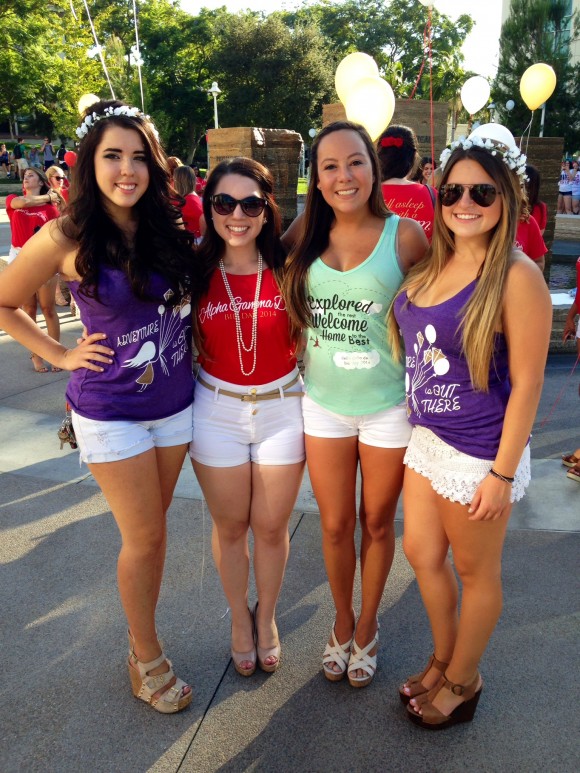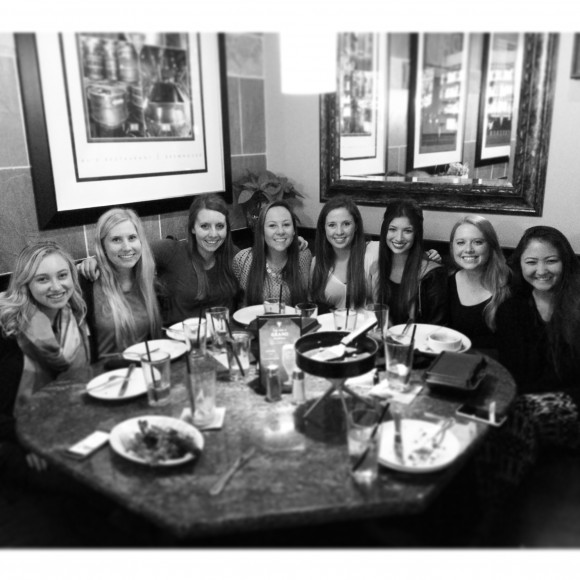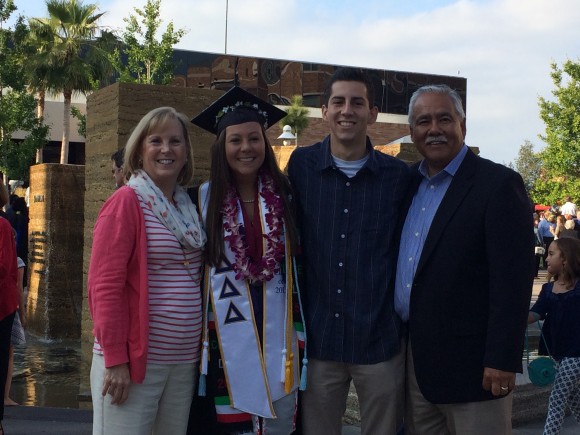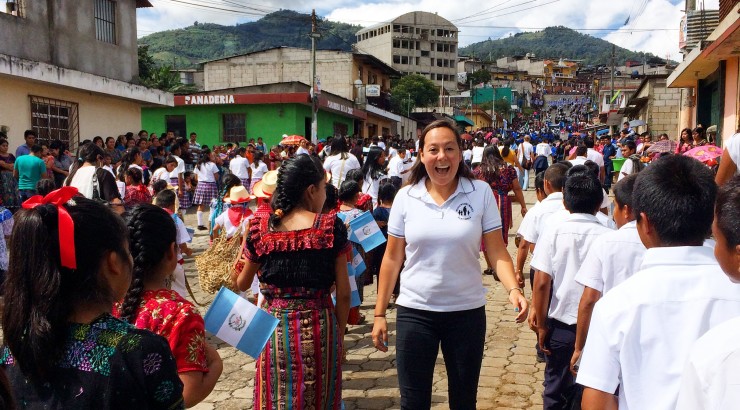Creating Meaning Through Service: Lauren Dominguez ’15 makes impact at Guatemalan orphanage
November 23, 2015
From mission trips in Mexico to rebuilding Hurricane Katrina victims’ homes in New Orleans, Lauren Dominguez, B.A. peace studies ’15 has always been a humanitarian at heart. From her Chapman experience, she developed the belief that the best way to learn about others is to be immersed in their culture. The recent grad has followed her own belief, rooting herself in Parramos, Guatemala, about an hour outside Guatemala City, at Nuestros Pequenos Hermanos, an orphanage of over 300 children. Through her experience with NPH, Lauren is carving out her own definition of “meaningful”—read on to find out what her remarkably inspiring experience has revealed to her!
Chapman University
: Tell us about your work with children in Guatemala. How did you get involved?
 Lauren Dominguez
Lauren Dominguez
: I currently work and live in an orphanage in a tiny town about an hour outside of Guatemala City. The organization that runs the home is Nuestros Pequenos Hermanos. I have had a very close relationship with NPH since 2008, the summer after my eighth grade year. In 2008 I went on a mission trip to the NPH home in Mexico. Right off the bat, I fell in love with the children, the house and the philosophy that guides the organization. I made so many friends in Mexico, as well as new friends from all over the U.S. who went on the trip with me. One of the very first people I met was a little boy who was in the fourth grade. He was very quiet and shy but would always find me and come hold my hand. He didn’t smile very much, but when he did it lit up his whole face. Since that first summer in 2008 I have been back to Mexico every summer. I have had the joy of watching that little boy grow, sponsoring him and having him become a very important part of my life. The organization and the people I have met through NPH have become a part of who I am. For me, the next logical step was to get involved with NPH in a bigger way. To me, getting more involved meant applying to be an international volunteer. I was accepted in the NPH volunteer program as a part of the home, Casa San Andres, in Guatemala that houses more than 300 children. I work in the school as a librarian and English teacher. I also provide additional support and care to a section of 14 girls, ages 10-14.
CU
: What inspired you to move to a different country after graduation?
LD
: While I have done some traveling, it has never been for more than a few weeks at a time. I did not study abroad during my time at Chapman, but I have always wanted to work abroad. I minored in Spanish with the plan that wherever I was going to be, I wanted my language skills to be put to good use. I also enjoy learning about other people and cultures, and, in my opinion, there is no better way to learn than to completely immerse yourself in another culture. I have been here for about three months, but my Spanish has already improved and I have tried and seen so many new things.
 CU
CU
: What insight would you give to current students and fellow alumni who are searching for meaningful careers?
LD
: Having a meaningful career can mean many things. It can be the work you do or feeling that you do your work with integrity and devotion. Having a meaningful career does not necessarily mean giving up all your worldly possessions and moving to a third world country. For some that may be the case, however, not for everyone. Having a meaningful career might be having a job in an office, doing well and knowing that you have put all your effort and energy into doing a good job. It may be working with children, teaching them how to live with open minds. It may be working in a garden and contributing time to bettering the planet. A meaningful career looks different to each person. I think it is important to take a step back and define “meaningful” with your own definition, not be defined by those who hired you or those you are working with, but why it’s meaningful for you.
CU
: What advice do you have for current students who want to make the most out of their time at Chapman?
LD
: Do everything, at least once even if you think you might not like it. I went to so many events and meetings, and tried so many new things during my time at Chapman. I was able to really learn about what I enjoyed and what I didn’t. Being involved on campus helped me manage my time throughout my four years because I was able to focus on the things that I was most passionate about.
CU
: From your time at Chapman, which faculty member(s) made the greatest impact on you and how?
 LD
LD
: One of the faculty members who impacted me the most was Dr. Rafel Luevano. I attended Catholic Mass during my time at Chapman and he was the priest that said Mass. After three years, I finally took a class with him. The way he discussed even the smallest things brought a new perspective to my life. It was amazing having him on campus. I could go to him with any problem that I was having. Even though we shared the same religion, I know many students who do not and still felt that he was truly inspirational, but also completely relatable. He taught me so much, not just about my faith, but about the world and how to interpret my experiences. When I was making the decision to take this position in Guatemala, he sat down with me and helped me figure it out, even though, during our discussion, I did most of the talking. He offered me a safe, reflective, and intellectual space to grow as a student and a person.
CU
: How has your Chapman degree helped you in your professional and personal life?
LD
: In Guatemala, my professional life and my personal life are the same. I live at the home, on-site in a volunteer house. The volunteer house is like Chapman. Chapman has so many students with different majors and interests, but they (we) can all still come together to be a part of the Chapman community. My experiences with other students at Chapman, whether in the classroom, dorm or club, helped prepare me to live in a unique environment. In the volunteer house, there are many different people from different countries all over the world. Even though we come from different places, we are all living and working in the same community, and are working towards the same goal of helping the orphaned and abandoned children live in a loving, safe environment. My degree in peace studies prepared me to work as an advocate for underserved populations.
CU
: How were you involved on campus during your time as a Chapman student?
LD
: During my time at Chapman I was a member of Delta Delta Delta, MEChA, as well as a student worker in the Office of Admissions. I conducted alumni interviews as part of the Student Discovery Initiative. I was also an orientation assistant, and I lived in the dorms my freshman and sophomore year.
CU
: What is your favorite Chapman memory?
LD
: During interterm my junior year, I had the opportunity to spend 10 days in New Orleans, La. rebuilding houses that had been destroyed by Hurricane Katrina. The experience I had in New Orleans was my best at Chapman because of how well-rounded it was. I have always been interested in expanding my worldview. Traveling to the South and seeing the damage of a hurricane from 10 years ago was astonishing and very quickly brought me back down to earth out of the “Chapman bubble.” I was able to help strangers fix their homes so that they would have a place to live, something I sometimes take for granted. The experience was not only great because I got to help people and I got to travel, but I also met an amazing group of Chapman students who I otherwise would not have met. All of us from different years and majors and backgrounds traveled together, and experienced New Orleans firsthand. Even though I was not physically at Chapman, traveling, helping and making new friends makes it a very Chapman experience, and my favorite one.
CU
: What was your favorite spot on campus as a student?
LD
: I loved spending time in the Fish Interfaith Center. Whether it was for a religious service, choir performance, or just walking through it in the afternoons while giving a tour, it was always so beautiful and calming.
CU
: Have you been involved with Chapman since graduating?
LD
: Not yet, but I hope to once I get back to the States. However, both of my parents are also Chapman alumni (from ’82 and ’83) and my younger brother, Mark, is currently a sophomore! My parents have been going to homecoming since before I was born and now that Mark is there, they make any excuse to stop by and see him, the campus, and their classmates who live in the area. So even though I have not been as involved since graduating in May, my family is well-represented.
CU
: Is there anything else you’d like to share with the Chapman Family?
LD
: If you are in Guatemala or happen to visit, send me an email—I would love to see you!
Explore and Connect Further:
-
Want to be featured in a blog like this, on social media or in Chapman Magazine? Share your news with us »
-
Want to catch up with alumni friends? Attend our next event »
-
Want to get involved with your alma mater? Volunteer with us or join an alumni group »
-
Who doesn’t like a good deal? Check out your alumni benefits and discounts »
-
Want to receive the monthly alumni e-newsletter and stay connected with Chapman? Make sure we have your current contact info »
Be sure to check out Lauren’s
blog
on her adventures in Guatemala! If you’d like to connect with Lauren, shoot her an
email
.
